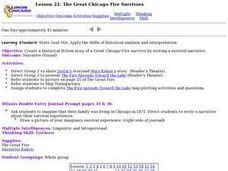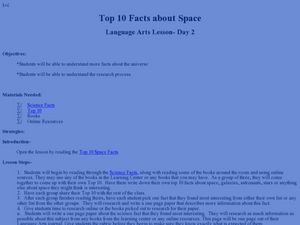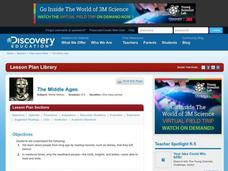Curated OER
A Day at the Beach-Why Did We Do It?
Learners investigate pollution at the beach. In this environmental lesson plan, students participate in a beach clean-up and calculate the weight of the debris collected. Learners write a reflection in their journal about their beach...
Curated OER
Ocean/Beach Center
Students examine different types of ocean life. They classify sea shells and role play in the ocean center. They color and write about their experience in the ocean center and share their experiences with their classmates.
Curated OER
Give a Hoot - Don't Pollute at Black Bayou Lake
Fourth graders visit Black Bayou Lake refuge to observe the effects of land and water pollution. They photograph examples of pollution. They list the effects of land and water pollution. They write a persuasive letter to convince others...
Curated OER
Ethnobotany Research Paper
Students are introduce and discuss Ethnobotany and develop their own research writing. Pupils research plants that have already been identifyed as having medicinal or cultural/historical value around the world. They investigate...
Curated OER
Lesson 22: The Great Chicago Fire Survivors
Students, in groups, create a historical fiction story of a Great Chicago Fire survivor by writing a survival narrative.
Curated OER
Solar System Slide Show
Learners work in small groups to research a planet in our Solar System in order to compare it to Earth. They examine the planet's size, atmosphere, rotation and revolution periods, temperature, and other attributes. They collect...
Curated OER
Magical Metamorphosis
Sixth graders compare and contrast incomplete and complete metamorphosis using a Venn Diagram. They predict, observe, measure, and record data on the life cycle of mealworms. Students write and illustrate the life cycle of the mealworm....
Curated OER
What Beautiful Caterpillars!
Second graders investigate the life cycle of the caterpillar. They create a caterpillar habitat and care for it. Students make daily observations that are recorded in a writing journal. During the process of observation the students...
Curated OER
The Water Cycle
Second graders use the program HyperStudio to draw and describe the water cycle. In this science and technology instructional activity, 2nd graders will first become familiar with the water cycle by exploring books and websites in the...
Curated OER
Stop, Look and Listen
Learners study and observe city wildlife and their local community's wildlife. In this wildlife lesson, students look for animal clues in their local places. Learners observe animals using cameras and journals. Students make a...
Curated OER
Where The Wild Things Are
Twelfth graders brainstorm where they think wild things exist. Then using the same strategy they discuss natural surroundings from using prior life experience. This part of the lesson can also be done with using a nature hike. Students...
Curated OER
Reuse and Respect!
Learners examine the concept of reusing trash to save the environment. In this environment lesson, students examine the definition of the word reuse, and apply it by finding ways to reuse trash in their school. They talk about what...
Curated OER
Jack and the Beanstalk
Third graders examine a reading selection. In this fairy tale lesson, 3rd graders read Jack and the Beanstalk. Students are divided into groups and each group lists the elements of a fairy tale and writes a script for a puppet play of...
Curated OER
Yummy for my tummy!
First graders read the story Tops and Bottoms and identify vegetables that are eaten from the stem, root, and leaf of a plant. In this vegetables lesson plan, 1st graders learn vocabulary about different vegetable parts and write journal...
Curated OER
Nutrients for Plants and People: Food Pyramid Garden
In this garden worksheet, students plant different types of food from the food pyramid into a garden and write a journal about all of the food. Students plant 4 levels of food from the food pyramid.
Curated OER
Top 10 Facts About Space
Students create their own Top 10 Facts about any topic related to space. In this space lesson, students work in groups to produce a Top Ten List of facts about space and share with their classmates. Groups choose a fact to research and...
Curated OER
Letter to the President
In this letter to the President instructional activity, learners write a letter to the President about earthquakes and volcanoes. Students include 4 bullet points in their letters.
Curated OER
Children's Literature Across the Curriculum Ideas: Chickens Aren't the Only Ones
Young scholars read Chickens Aren't the Only Ones by Ruth Heller. They complete a variety of cross-curricular activities surrounding the study of animals that come from eggs. Included are reading, art, math, science, writing, social...
Curated OER
The Middle Ages
Students discuss the Middle Ages. In this social science lesson, students role-play that they are medieval lords, knights, and ladies who keep diaries. Students write what they would have put in their diaries and decorate their diaries.
Curated OER
Trout Life-Cycle Booklet
Learners write books about trout, completing one page per life stage.
Curated OER
Building on the Past
Students consider how the scientific advances of the past have contributed to the science topics reported on today in the Science Times section. After reading a current science article, they compare and contrast the way science was...
Curated OER
Smallville Prairie Development Project
Students research the characteristics of the prairie habitat focusing on scientific, social/historical and aesthetic values. They investigate how humans impact the prairie habitat while maintaining a daily journal of research and...
Curated OER
Introduction to Toxicology
Students explore the science of toxicology and the relationship between a toxic reaction (response) and amount of substance (dose). They observe two demonstrations illustrating the concept of dose-response.
Curated OER
A Guide (on the Side) to Physics
Students engage in a lesson that is concerned with the concepts related to the study of Physics. They participate in class discussion and list common misconceptions of Physics. Students write and discuss the problem of Science illiteracy.

























